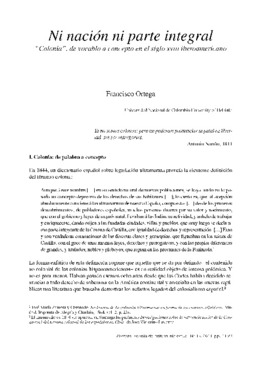Mostrar el registro sencillo del ítem
Ni nación ni parte integral : “Colonia”, de vocablo a concepto en el siglo XVIII iberoamericano
Neither a nation nor an integral portion : “ Colony” from noun to concept in the Eighteen Century in Iberoamerica
| dc.creator | Ortega, Francisco | |
| dc.date.accessioned | 2020-02-03T17:55:11Z | |
| dc.date.available | 2020-02-03T17:55:11Z | |
| dc.date.issued | 2011 | |
| dc.identifier.citation | Ortega, F. (2011). Ni nación ni parte integral : “Colonia”, de vocablo a concepto en el siglo XVIII iberoamericano. Prismas, 15(15), 11-29. | es |
| dc.identifier.issn | 1666-1508 (impresa) | es |
| dc.identifier.issn | 1852-0499 (en línea) | es |
| dc.identifier.uri | http://ridaa.unq.edu.ar/handle/20.500.11807/1834 | |
| dc.description | Fil: Ortega, Francisco. Universidad Nacional de Colombia; Colombia. | es |
| dc.description | Fil: Ortega, Francisco. Helsingin Yliopisto; Finlandia. | es |
| dc.description.abstract | En este artículo reconstruyo el proceso por medio del cual el vocablo “colonia” adquirió calidad de concepto sociopolítico a lo largo del siglo XVIII en relación con las reformas borbónicas, el ascenso del absolutismo, las revoluciones atlánticas (incluyendo, de manera particular, sus dos variantes americanas: la norteamericana y la haitiana), la emergencia de un imaginario republicano y el fortalecimiento de las elites criollas. Al contrario de lo que podría pensarse, la noción evaluativa descriptiva de “colonia” no era conceptualmente ajena a los agentes del antiguo régimen y del nuevo orden sociopolítico. Aun más, el problema colonial era central para la cultura política del período en tanto designaba una experiencia de negatividad política que hacían suya en ese momento y desde la cual se hacía necesario y urgente pensar la fundación de una nueva soberanía. | es |
| dc.description.abstract | In this article I reconstruct the process by which the term “colony” became a socio-political concept towards the end of the eighteenth century, a process which took place in connection with the Bourbon reforms, the rise of absolutism, the Atlantic revolutions (including the North American and the Haitian), the emergence of a Republican imaginary and the strengthening of local elites. Contrary to widespread belief, the descriptive evaluative notion of “colony” was not alien to late 18th century American intellectual elites. Furthermore, such definitions of the colonial experience became central to the political culture of the period by designating an experience of political negativity from which it became necessary and urgent to think and reflect upon the foundation of a new sovereignty. | es |
| dc.format | application/pdf | es |
| dc.language | spa | es |
| dc.publisher | Universidad Nacional de Quilmes | es |
| dc.rights | https://creativecommons.org/licenses/by-nc-nd/2.5/ar/ | es |
| dc.source | Prismas | es |
| dc.subject | Colonia | es |
| dc.subject | Nación | es |
| dc.subject | Soberanía | es |
| dc.subject | Época colonial | es |
| dc.subject | Siglo XVIII | es |
| dc.subject | Colony | es |
| dc.subject | Nation | es |
| dc.subject | Sovereignty | es |
| dc.subject | Colonial period | es |
| dc.subject | Eighteenth century | es |
| dc.subject | Colônia | es |
| dc.subject | Nação | es |
| dc.subject | Soberania | es |
| dc.subject | Era colonial | es |
| dc.subject | Século XVIII | es |
| dc.title | Ni nación ni parte integral : “Colonia”, de vocablo a concepto en el siglo XVIII iberoamericano | es |
| dc.title | Neither a nation nor an integral portion : “ Colony” from noun to concept in the Eighteen Century in Iberoamerica | es |
| dc.type | info:ar-repo/semantics/artículo | es |
| unq.blm.ubicacion | P-AR-PRI1 | es |
| unq.articulos.paginicio | 11 | es |
| unq.articulos.pagfinal | 29 | es |
| unq.revista.numero | 15 | es |
| unq.revista.volumen | 15 | es |
| unq.version | info:eu-repo/semantics/publishedVersion | es |
| unq.articulos.seccion | Artículos | es |
| unq.tipo.snrd | info:eu-repo/semantics/article | es |
| unq.acceso | info:eu-repo/semantics/openAccess | es |
Ficheros en el ítem
Este ítem aparece en la(s) siguiente(s) colección(ones)
-
No. 15
Publicada en 2011.

